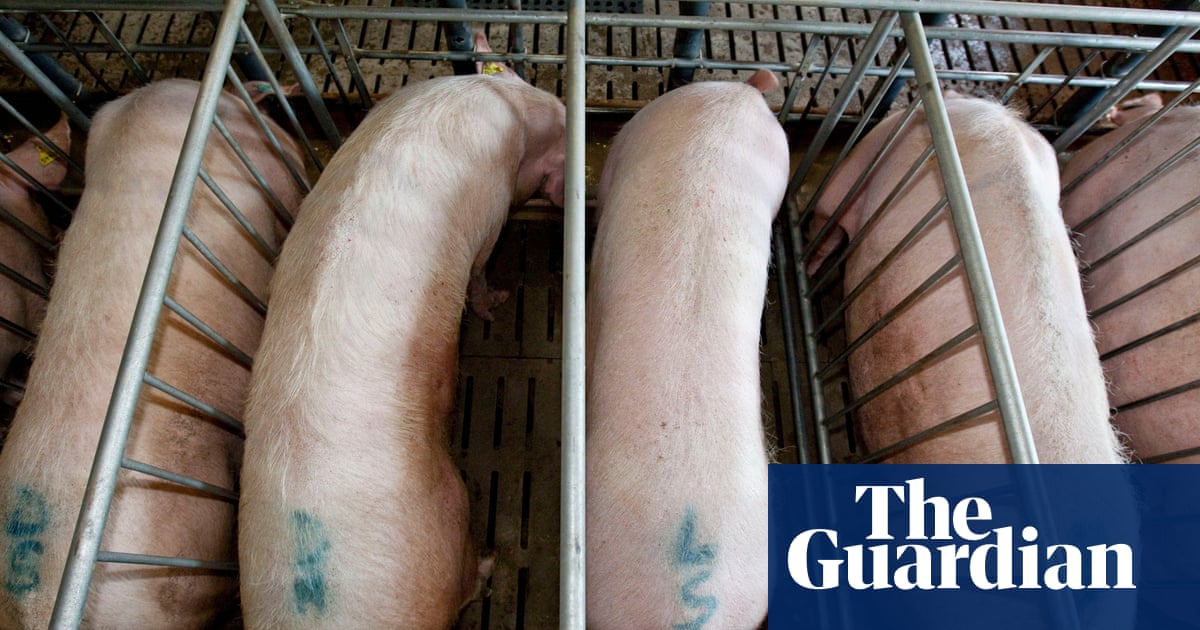The use of restrictive pens to temporarily house pregnant pigs in the UK severely compromises their welfare, can traumatise them and should be banned, experts have said.
Analysis byAnimal Equality UKof footage collected from a farm in Devon showed that three pregnant sows in farrowing crates spent more than 90% of their time lying down, with one not standing up at all for a day. On average, between them they bit the bars (a sign of extreme stress) more than once an hour.
The farm is part of the Red Tractor scheme, used to mark food produced to a “high standard”, and supplies Tesco.
Animal Equality UK said it illustrated the wider problem with farrowing crates, in which more than 200,000 sows are confined each year in the UK.
Dr Helen Lambert, who is on the stakeholder advisory board for the Animal Welfare Research Network, was one of several experts who analysed the footage, which was collected continuously across five days.
She said: “All three pigs spent most of their time lying down – considerably more time than postpartum pigs, who can move more freely. Throughout the footage, the sows can be seen engaging in two key stereotypic behaviours: sham chewing and bar-biting … They are usually born out of frustration and stress due to an animal’s inability to perform normal, instinctive behaviours.
“The mental state of these three pigs is severely compromised.”
Animal Equality UK’s report says sows will spend nearly a quarter (22%) of their lives in farrowing crates before, during and after birth when they are lactating.
The crates supposedly prevent sows crushing their piglets by restricting their movement, but have been banned in several countries because of animal welfare concerns.
Prof Steve McCulloch, a fellow of the Royal College of Veterinary Surgeons who also reviewed Animal Equality UK’s findings, said: “The principal ‘benefit’ of farrowing crates is not to reduce piglet mortality, but to minimise production costs … Breeding sows are very likely to suffer from post-traumatic stress disorder once they have been removed from the farrowing crates at weaning.”
Animal Equality UK said the footage showed one pig did not touch the enrichment provided (a plastic stick or wooden block) during the five-day period, none of the pigs were able to walk, root or nest, and the lights were on continuously.
The National Pig Association (NPA) and Red Tractor both said they were supportive of producers moving away from conventional farrowing systems towards flexible ones whereby the crate is opened once the piglets are more robust.
An NPA spokesperson said: “This transition must be within a sensible timeframe and supported by the market and/or by infrastructure grants in order to make it viable for producers and not push businesses out of pig production.”
The report says such systems are “ethically indefensible” in their failure to address core welfare issues, and that piglet mortality is often higher in “flexible” pens than traditional crates.
Abigail Penny, the executive director of Animal Equality UK, said: “Cages must be banned. Forcing intelligent mother pigs to eat, sleep and defecate in a highly cramped space is unimaginably cruel. Such extreme confinement takes a terrible toll on the animals, who – unable to escape – inevitably become hopeless and traumatised.”
A Tesco spokesperson said: “We take animal welfare matters extremely seriously and immediately suspended the farm when we became aware of this footage last year. We have worked closely with the supplier and only allowed the farm to return into our supply once both Red Tractor and our specialist agriculture team were satisfied that robust action had been taken. The farm continues to be monitored by our supplier to ensure conditions have improved.”
WJ Watkins and Son, which owns Cross Farm in Holsworthy, Devon, where the filming took place, was approached for comment.
